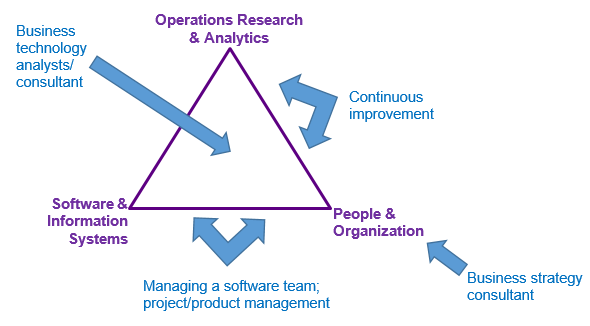What is the difference between Management Engineering and business programs?
An undergraduate business program focuses on these disciplines: accounting, finance, sales, human resources, and marketing. A typical business degree program is structured to ensure that students concentrate more on business functions and earn credits to qualify for professional designations such as Chartered Financial Analyst (CFA) and Chartered Professional Accountant (CPA).
Management engineering is an accredited engineering program within the Faculty of Engineering. Management Engineers design, implement, and manage complex management systems upon which organizations depend. Management engineering provides more focus and greater depth in science, mathematics, and engineering design and deals with identifying and solving the problems that managers and others face when making decisions - decisions about how to make better end products and how to run the business more efficiently and effectively. Management engineering graduates are eligible to apply for a professional engineering (PEng.) designation.
People and organizations comprises one of the three theme areas in Management Engineering. Therefore, Management Engineering students take a number of courses – core and electives - that may traditionally be found in business programs, covering topics of economics, finance, organizational behaviour and design, management of technology, and entrepreneurship. In this regard, of the 14 engineering programs offered at the University of Waterloo, Management Engineering has the most such courses in its core and elective curriculum.
What is the “business” component in the Management Engineering curriculum?
In second year, students take 2 economics courses – MSCI 261 Engineering Economics: Financial Management for Engineers and MSCI 263 Managerial Economics. In MSCI 261, students learn about the cash flow analysis and how to evaluate different investment methods, while becoming aware about the effect of inflation and taxation on investment decisions. In MSCI 263 students learn key concepts in microeconomics, with an emphasis on applications to managerial decision-making.
In third year, students take MSCI 211 Organizational Behaviour where they learn about the psychology of individuals and small groups in organizations and their impact on business management. Students build on those concepts in MSCI 311 Organizational Design & Technology, which they take in fourth year, by learning about organizational structures and their interactions with and reactions to technology and other organizations in their environments.
Students wishing to specialize further in this theme area, are also able to take a number of electives, including:
- MSCI 411 Leadership and Influence,
- MSCI 421 Strategic Management of Technology,
- MSCI 422 Economic Impact of Technological Change and Entrepreneurship,
- MSCI 423 Managing New Product and Process Innovation,
- MSCI 442 Impact of Information Systems on Organizations and Society, and
- MSCI 454 Technical Entrepreneurship,
Finally, a large number of students further develop their business savvy through their capstone design project (MSCI 401/402) in the 4A and 4B terms. Management Engineering students routinely design sophisticated mobile and web applications to solve real-world business problems. Recent examples of such projects include a mobile application to improve the online shopping experience, a merchandize-comparison tool for TJX Canada, a tool to maximize shoppers’ rewards from their credit cards, and overtime cost reduction through the development of performance-based pay structures.
Do Management Engineers develop business and management skills on co-op or in their full-time jobs after graduation?
People and organizations comprises one of the three theme areas of Management Engineering, together with Operations Research & Analytics and Software & Information Systems. Students that – through courses and co-op – choose to specialize in the people and organizations area, may build careers as business strategy consultants. Many more students find their passions lie at the intersection of people and organizations and the other two areas. At the intersection with Operations Research & Analytics, management engineers may work in as business/process improvement leads. At the intersection with Software & Information Systems, management engineers work as managers of software teams or as project/product managers. And, at the intersection of all three areas, we find many graduates working as business technology consultants.

Management Engineering's 3 theme areas (in purple) and typical careers in which Management Engineering graduates develop business and management skills (in blue)
Find out more about Management Engineering careers.